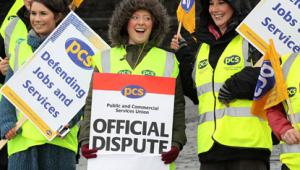18 July 2008
Striking civil servants joined hundreds of thousands of council workers on the picket lines this week as the battle over the government's attempts to limit public sector pay stepped up a gear.
Chancellor Alistair Darling reiterated the government's determination to hold pay down on the eve of the strikes, warning: 'We cannot allow inflationary wage increases.'
But unions pointed to their members' struggle to deal with the rising cost of living, as the Consumer Price Index – the government's preferred measure of inflation – surged from 3.3% to 3.8% in June, a 16-year high.
The council workers' two-day walkout sparked a war of words between employers and unions over whether town halls could afford to increase their pay offer.
Local Government Employers managing director Jan Parkinson declared: 'This week's strikes will not change the fact that our last offer was our final offer.' Councils had 'simply reached the limit of what is affordable', she said.
But Unison general secretary Dave Prentis countered: 'It's a disgrace that the employers are still refusing to negotiate and pleading poverty when by their own figures they have £3bn languishing in bank accounts, some of which could be used to pay our members a decent, living wage.'
This call to dip into reserves was described as a 'red herring' by an LGE spokesman. 'The whole point of reserves is they can only be used once,' he said. 'This is not a sustainable way to deal with pay.'
This argument was backed by CIPFA chief executive Steve Freer, who told the BBC's World at One programme: 'It really is just bad financial management to pay for a pay award by calling down and using some of your one-off savings.
'If authorities do that they'll find themselves in huge difficulties next year when the pay award's still there to be paid for because it's ongoing but the reserves have been used up.'
In this week's action, town halls and libraries were shut down, refuse collections were halted and around 11,000 schools were closed during the July 16–17 strike by local government members of the Unison and Unite unions. Both unions have rejected a 2.45% pay offer.
Civil service members of the Public and Commercial Services union also began rolling strikes over pay, with Driving Standards Agency staff walking out on July 16 and Home Office staff following on July 18.
PCS members at the Identity and Passport Service are to strike on July 23–25.
PFjul2008



















